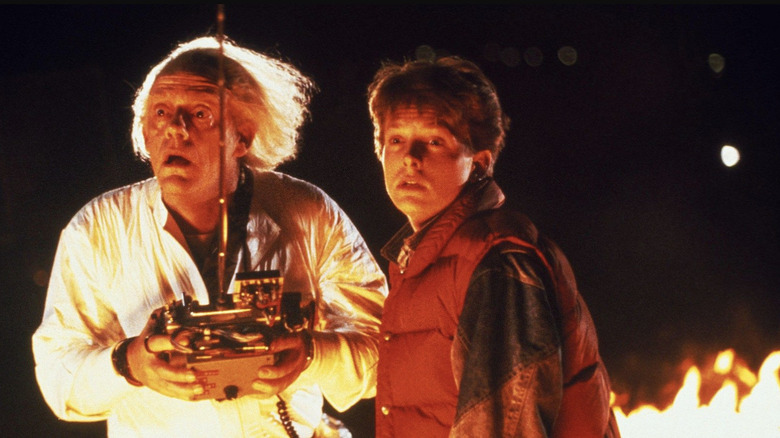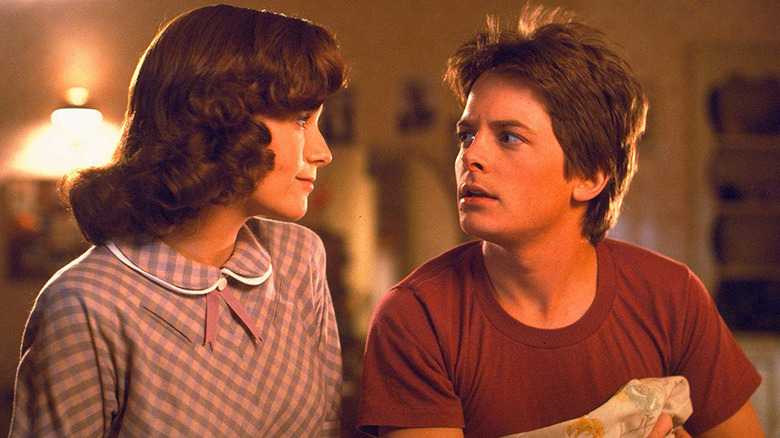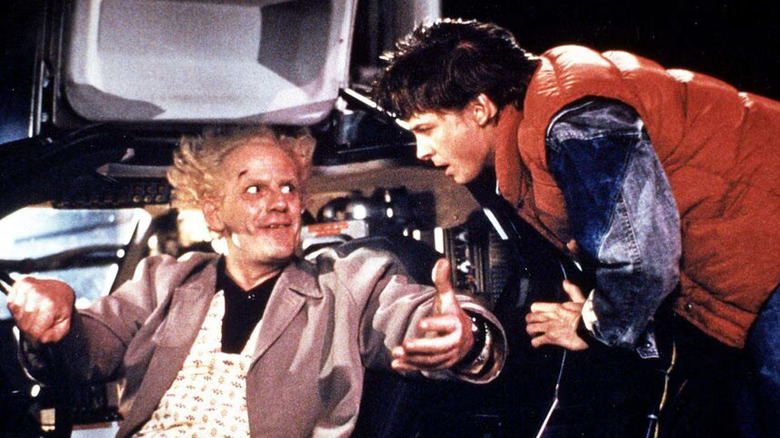Back To The Future Was Banned In China For A Wild Reason
Thought may be the most powerful force in the space-time continuum. As Doctor Emmett L. Brown says in "Back to the Future," the act is the one and only key to guaranteed success: "If you put your mind to it, you can accomplish anything." This is why any system of control seeks to quell (if not eradicate) free thought as its primary goal because those behind such systems rightfully understand that thought is the biggest threat to their maintaining power. Although governments and censorship boards banning art can be done under a variety of pretenses — this is deemed obscene, that is deemed offensive, and so on — what censoring or outright banning art really does is keep people in line.
Of course, that doesn't mean censorship always makes a ton of sense. Numerous instances of censored or banned art feel absolutely baffling. For instance, did you know that depicting someone head-butting someone else in a show or movie was a huge issue for the British Board of Film Classification during the 1990s? Back in 2011, the Chinese government banned movies and shows depicting time travel, meaning that 1985's "Back to the Future," a beloved all-ages classic sci-fi comedy, came to be banned in China. On the face of it, this seems like an absurd rationale; after all, time travel is blatantly not actually possible in a literal sense, thus banning it seems like banning using superpowers. Yet the intention behind the ban makes it clear that there's a much more insidious reason for it, as well as demonstrates how "Back to the Future" and movies like it have real cultural value beyond mere entertainment.
China understood that 'Back to the Future' contains subversive messaging
Upon banning movies and shows with time travel in them, the Chinese government (which is under the control of the Chinese Communist Party) claimed that the reason for the ban was because such fiction "disrespects history," and that "producers and writers are treating serious history in a frivolous way, which should by no means be encouraged anymore." Critic and journalist Raymond Zhou Liming noted in addition to the government's official statement that "whatever isn't possible in the real world belongs to superstition." Of course, the Chinese government's rationale only hints at what must be part of the real point behind the ban; as Zach Hindin opined for The Atlantic in 2015, "How might upsetting history, say in a depiction of time travel, upset the status quo?" In another comment, Zhou mentioned how time travel fiction "is actually not heavy on science, but an excuse to comment on current affairs," a quality that is a byproduct of all genre fiction, intentional or not. When all of this is added up, it's clear that what the Chinese government really wanted to ban is not time travel per se, but the ways in which stories utilizing the trope revisit, reappraise, and investigate history from a modern perspective.
In this fashion, all time travel stories are subversive, since the majority of them involve the ability for history to be changed (either for the better or for the worse). Even beyond this, "Back to the Future" is a pretty boundary-pushing movie. Its inclusion of topics like terrorism and incest meant that it wasn't an easy sell to major studios, and even its combination of humor, adventure, and science-fiction baffled at least one executive at the studio it did end up at. The movie is so shrewd in its satire that a joke at Ronald Reagan's expense was allegedly well-received by the President himself! Even though "Back to the Future" has gained a relatively cuddly reputation in the nearly 40 years since its release, it's got quite a lot going on beneath the surface, something the Chinese government perhaps caught on to.
Access to cinema is our very own flux capacitor
Writers Robert Zemeckis and Bob Gale had made a career for themselves looking at American history through a skewed lens, co-writing films like "I Wanna Hold Your Hand" and Steven Spielberg's "1941," which took the rose-colored nostalgia glasses off of Beatlemania and WWII, respectively. This makes "Back to the Future" their magnum opus, a movie where an '80s-era son and a '50s-era mother and father come to realize their time periods and themselves have much more in common than they initially thought. Even the movie's "happy ending" isn't quite that — sure, the McFly's end up living in an '80s capitalist fantasy, but Marty (Michael J. Fox) is dismayed to learn just as soon as he's gotten his dream girl and car that "something's gotta be done about your kids."
As long as the Chinese government is banning art based on their keen understanding of its power to allow us to have a macro view of our history (and thus give us motivation to try and change the future), let me scare them further by saying that cinema, and access to cinema, is the only actual form of time travel that we have available to us. Delving into film history is a great start to understanding actual history, not as it was, but as it was felt, how it was processed, and what we might still learn from it. Unlike the Chinese, we Americans are lucky to have the freedom to be time travelers — at least, for now.


